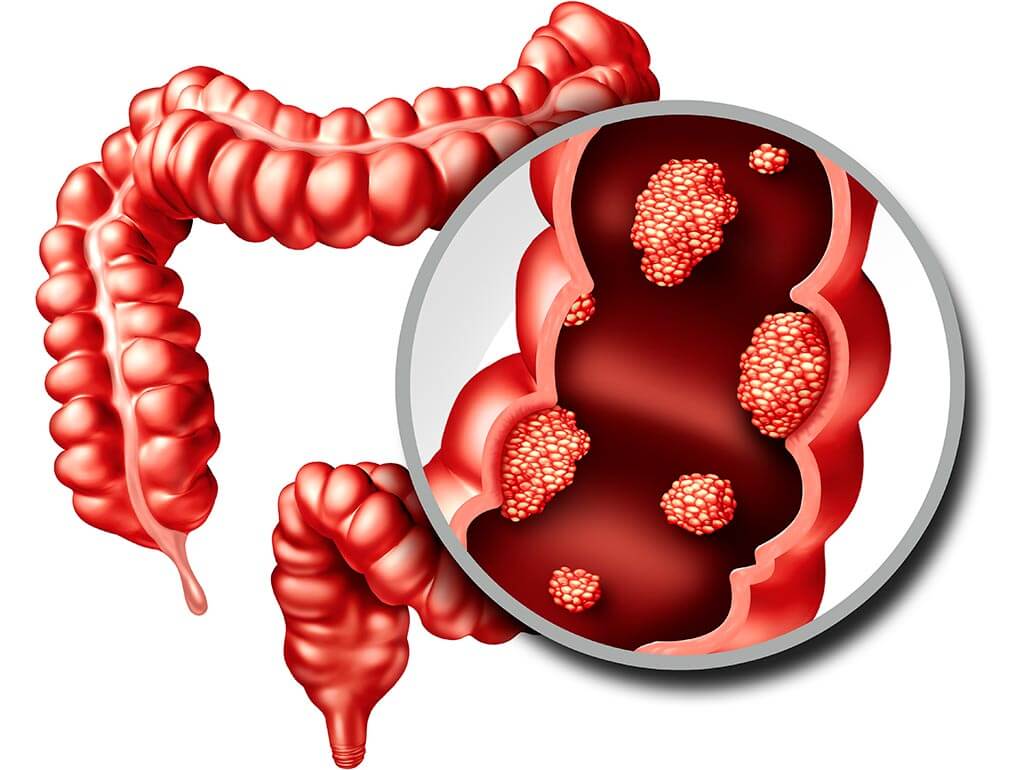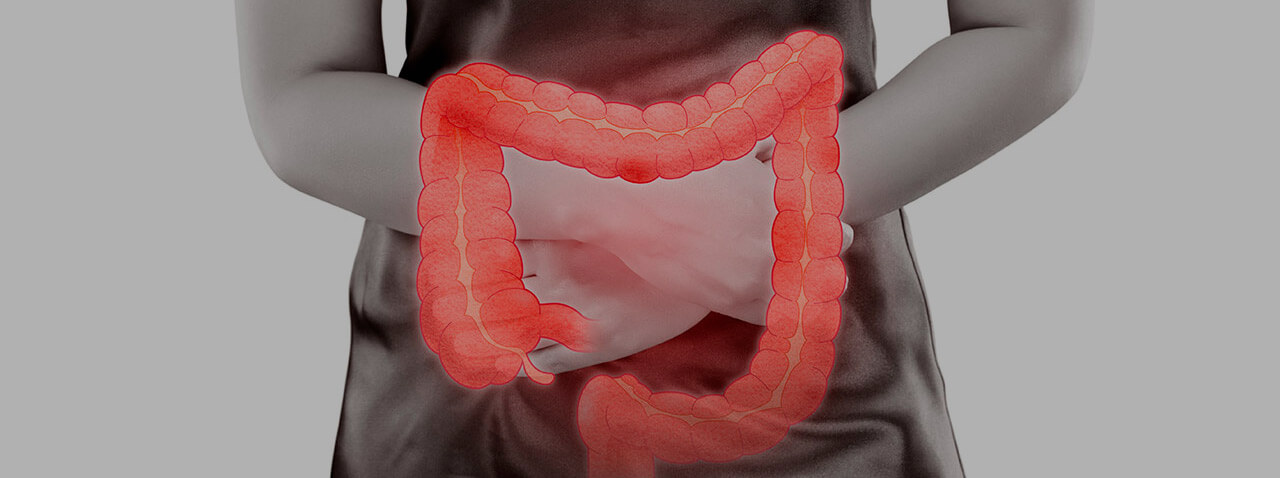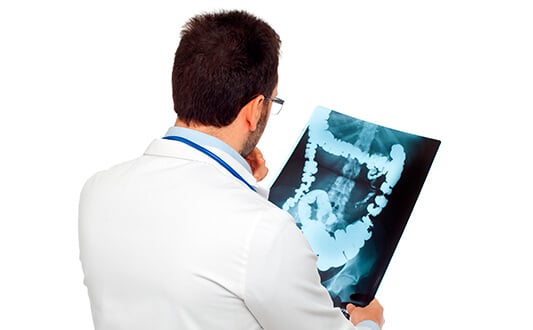Symptoms of bowel cancer can be difficult to detect. The symptoms usually begin with abdominal pain, diarrhea, or constipation. Since the bowel cancer manifests itself with very nonspecific symptoms, it is often diagnosed late, when the tumor has already metastasized. Therefore, the survival rate of patients is low. Generally symptoms are mild and gives the patient no cause for concern to go and see a doctor. Everyone should know what the symptoms of bowel cancer are. This knowledge will enlighten you to the suspicion of the disease should you experience related symptoms, in time to visit a doctor to undergo the necessary diagnostics.
Content
- Early symptoms of bowel cancer
- Clinical forms of bowel cancer
- Clinical diagnosis and at-risk groups for bowel cancer
- Symptoms of bowel and stomach cancer
- Rectal and bowel cancer symptoms
- Hospitals and cost of bowel cancer treatment
- Organization of Bowel Cancer Treatment Abroad
Early symptoms of bowel cancer
Pathognomonic signs and symptoms of intestinal cancer do not exist. There are no such clinical signs, that can with certainty determine that it is bowel cancer. Symptoms do not always give reason to suspect this disease. The symptoms are nonspecific and are found in hundreds of other diseases. This is one of the reasons why bowel cancer symptoms are often not detected on time and why the disease is diagnosed only at a late stage (i.e. beyond the stage one-three).
The signs and symptoms of bowel cancer depend on many factors:
- Localization of the neoplasm (right or left parts of the colon, sigmoid colon, etc.)
- Its histological type
- Character of growth (endophytic or exophytic)
These are the first signs of bowel cancer a person may experience. If they are identified, a person needs to see a doctor for testing and in-depth examination.
Abdominal pain
Abdominal pain is the most frequent symptom in gastroenterology. It's also the least specific. Chronic pain can be the first sign of bowel cancer, especially if the neoplasm is located in the right side of the intestine (the ascending part of the colon). In this case, as being the very first sign of bowel cancer, the pain is twice as common, compared to tumor located on the left side.
Severity of pain can be different. Sometimes the pain is mild and dull. Then patients do not seek medical help immediately, trying to treat these primary signs of bowel cancer with the help of various drugs. Usually this is mistaken for gastritis, peptic ulcer, food infection - anything, but not a tumor.
In other cases, the pain is sharp, paroxysmal. A person can even be hospitalized. In this case, the chances that the doctor will detect the first symptoms of bowel cancer are quite high. After all, such continuous high-intensity pain will prompt the doctor-gastroenterologist to conduct a complex diagnostics using instrumental methods.
Upper dyspepsia
The syndrome of intestinal discomfort develops, which includes a whole group of various symptoms. This includes the phenomena of upper and lower dyspepsia. Upper dyspepsia includes such symptoms as nausea, vomiting, heaviness in the epigastrium, eructation, anorexia. These first symptoms of bowel cancer are most typical if the neoplasm is located in the transverse colon. It is in immediate anatomical proximity to the small intestine and stomach. By squeezing them, the neoplasm causes the above listed clinical signs of bowel cancer.
Lower dyspepsia
Lower dyspeptic syndrome or intestinal disorders include:
- Flatulence
- Constipation
- Diarrhea
- Rumbling
Most often, such symptoms of bowel cancer appear in the stage 1-3 in case of left-sided neoplasm, when it is located in the descending part of the colon.
The frequent development of intestinal obstruction with such oncological localization is explained by the fact that the fecal masses first pass through the right half of the intestine, and then through the left one. Here it is already of fairly dense consistency. Therefore, it is much more difficult for fecal masses to "squeeze" past a tumor. Symptoms of bowel cancer at an early stage are caused by partial intestinal obstruction. In later stages such obstruction can become complete. In this case, defecation is absent, a person experiences severe pain and is hospitalized and this is how the tumor will be detected.
Impurities in feces
Sometimes the first symptoms of bowel cancer are the presence of impurities in the stool. A person can discover blood, mucus, pus in feces. This symptom is also not pathognomonic (characteristic only for oncology of the intestine). There are dozens of other diseases, which are also accompanied by pathological impurities in the feces. Moreover, many of them are much more common than bowel cancer, such as hemorrhoids, anal fissures or inflammatory processes of the distal parts of the intestine (proctitis, sigmoiditis). The more distal (closer to the anal opening) the tutor is, the more likely the detection of impurities in the feces, which will become the first detected symptom of bowel cancer at an early stage of the disease. Especially often the discharge of blood from the anus is detected if neoplasms are located in the rectum or sigmoid colon.
Intoxication syndrome
The syndrome of general intoxication is manifested by weakness, malaise, myalgia, headache, fever and progressive weight loss. Also, anemia can develop because of constant blood loss. As a result, it can be accompanied by pale skin, shortness of breath and rapid pulse.
Such symptoms of bowel cancer in the early stages are most characteristic for neoplasm located in the right half of the intestine. In the ascending part of the large intestine, there are many villi, through which nutrients enter the bloodstream. As a result, the products of tumor disintegration penetrate into the systemic blood stream and symptoms of intoxication develop.
Now you know what the most common first symptoms of bowel cancer are. The onset of such symptoms should be reason enough to go see a doctor for a diagnosis as soon as possible.
Clinical forms of bowel cancer
Based on which bowel cancer symptoms appear first, the disease is divided into several clinical forms.
Toxico-anemic form
Intoxication and anemic syndromes are the most common symptoms in a toxic-anemic type of bowel cancer. Patients with this form often do not experience neither abdominal pain nor dyspepsia. They do not even go to the gastroenterologist.
Patients can be treated for a long time by infectionists for unknown infections, because pathology is accompanied by fever and general intoxication. Sometimes they are observed for a long time by the hematologist to treat iron deficiency anemia. Since bowel cancer manifests itself in atypical symptoms, it is usually diagnosed late, when the tumor has already reached a large size and spread to other organs.
Enterocolitis form
Symptoms often resemble inflammatory diseases. Patients are diagnosed with colitis or enterocolitis. Bowel cancer manifests itself in intestinal disorders. Even the presence of impurities in feces and elevated body temperature are often not a sufficient reason to suspect bowel cancer. The patient is often diagnosed with dysentery and treated with antibacterial drugs.
Dyspeptic form
In the dyspeptic form, the bowel cancer manifests itself with the symptoms of gastrointestinal discomfort. Upper dyspepsia develops. Often such patients are diagnosed with cholecystitis, gastritis or stomach ulcer. However, a study of the upper parts of the digestive tract does not yield any results, because symptoms appear when the upper part of the digestive tract are squeezed from the outside when the tumor reaches a measurable size.
Obturation form
Symptoms associated with intestinal obstruction are more likely to develop if bowel cancer is located in the left colon. It automatically blocks the movement of stool. At the initial stage of cancer the person suffers from constipation. Later on, complete intestinal obstruction occurs.
Pseudoinflammatory form
Pseudoinflammatory form is the most difficult to diagnose in the early stages. Depending on the location of the tumor, it imitates pyelonephritis, appendicitis and peritonitis. In women, such symptoms can lead to a suspicion of adnexitis, salpingo-oophoritis or pelvic-peritonitis.
Pseudoinflammatory form of bowel cancer is manifested by abdominal pain, fever and irritation of the peritoneum. Leukocytosis is found in the blood - a laboratory sign indicating an inflammatory disease.
Often, such symptoms appear if there is a real purulent inflammatory process that develops as a complication of cancer. Purulent inflammation can develop as a paracolite. It is caused by the onset of tumor disintegration and tissue rejection accompanied by a bacterial infection.
Tumorous form
In bowel cancer, symptoms are sometimes not determined at all. The patient does not complain about anything. The first clinical sign, which is detected by an objective examination, is a palpable formation in the abdomen. This form of the disease is also called atypical, because a palpable tumor, as the first symptom of bowel cancer, is very rare.

Clinical diagnosis and at-risk groups for bowel cancer
Since bowel cancer is symptomatically nonspecific, it can be difficult to detect. Obviously, the doctor does not send every patient with an abdominal pain for a biopsy. Even if blood is detected in the stool, the doctor will rather think about the inflammatory process rather than the tumor, because intestinal inflammations are more common than malignant neoplasms.
To understand who requires a targeted diagnosis, all patients with dyspepsia, abdominal pain and other gastroenterological signs are divided into risk groups of oncopathology. A high risk group means that the probability of detecting bowel cancer during diagnosis is 70-80%.
Here are the main criteria which can put a person into a high-risk group:
- Bleeding from the rectum, which is accompanied by frequent stools, an increase in the false urge to defecate for at least 6 consecutive weeks, regardless of the age of the patient
- Increased stool and false urge to defecate for 6 consecutive weeks without bleeding in patients aged 60 years or older
- Chronic bleeding from the rectum in the absence of other clinical signs, provided the age of the patient is older than 60 years of age.
- The presence of a palpable tumor-like formation in the abdominal cavity, regardless of age(defined when touching the abdominal wall)
- The formation is palpable in the rectum during manual examination
- Unexplained anemia with a hemoglobin level in men is less than 110 g / l, in women less than 100 g / l in menopause
All these symptoms occur quite often in bowel cancer. They usually alert the doctor about an oncological risk. The patient is advised to undergo examination aimed at detecting the tumor and determining its histological type.
There is also a low-risk group. Here are bowel cancer symptoms that are are the reason for including patients in this group with the need for further examination:
- Long-term treatment of chronic intestinal diseases, frequent recurrence of these chronic conditions, low efficiency of conservative treatment
- Bleeding from the rectum and appearance of anal symptoms
- Bleeding from the rectum in combination with anal fissures or rectal prolapse
- Constipation or diarrhea for at least 6 consecutive weeks
- Abdominal pain
Symptoms of bowel and stomach cancer
During the diagnosis, the doctor is able to distinguish different diseases that have similar clinical signs. A good oncologist or gastroenterologist always knows what symptoms of bowel cancer distinguish it from stomach cancer.
Both diseases can be accompanied with fair frequency by:
- Abdominal pain
- Blood from the anus
- Upper dyspepsia (belching, discomfort, etc.)
- Weight loss and general intoxication syndrome
- Signs of anemia (pallor of the skin, shortness of breath, tachycardia)
But some symptoms of stomach and bowel cancer are significantly different. They enable the doctor to suspect the main localization of the pathological process.
Here are the main differences:
- Vomiting with blood. In stomach cancer, blood flows directly into its cavity, so it can come out with vomit. In bowel cancer this does not happen. Vomiting is very rare. Even if it is present, there are no admixtures of blood in the vomit masses.
- Pain. Regardless of the stage of the bowel cancer, symptoms are mainly localized in the lower or middle part of the abdomen. Accordingly, the pain is located below the navel or on the side, in the right or left iliac region. In stomach cancer, pain is located above the navel, often on the left side. Although it is difficult to judge the origin of the oncological process based on the pain syndrome because pain in the upper abdomen can also be present in cancer of the transverse colon. However, in any case, in combination with other clinical signs location of the pain helps to suggest where the tutor may be located.
- Blood in the faeces. Symptoms of stomach and bowel cancer include impurities in the faeces. However, the way blood looks is significantly different, depending on whether it mixes with hydrochloric acid. The more distal (closer to the anus) is the source of bleeding (swelling), the more scarlet is the colour of the blood. If the bleeding comes from the stomach, the blood will be black.
- Fast filling of the stomach. Although many signs of stomach and bowel cancer are similar, some of the symptoms are characteristic for only one of the diseases. For example, early satiety, a full stomach feeling, vomiting after eating is characteristic of stomach cancer. The tumor takes up a lot of space and reduces the volume of the organ.
Knowing how symptoms of bowel and stomach cancer differ, a doctor can correctly plan the amount of necessary diagnostic tests. For example, if he/she suspects stomach cancer, he/she will appoint an EGF, and if there are symptoms of bowel cancer, the doctor will conduct irrigoscopy or a colonoscopy.
Rectal and bowel cancer symptoms
According to the international classification, the symptoms of bowel and rectal cancer indicate one disease, called colorectal cancer. In fact, the rectum is part of the intestine. However, differential diagnosis is still necessary. It is important for the doctor to know the exact location of the pathology in order to plan the optimal treatment strategy. Despite a lot of common symptoms (constipation, intestinal obstruction, anemia, bleeding), some signs of rectal and bowel cancer are fundamentally different.
In rectal cancer:
- The main symptom is rectal bleeding
- Anal symptoms (itching, sensation of foreign body) are felt
- Palpable tumor during a digital rectal examination
- Pain is localized in the anus, not the abdomen
At the same time, a number of symptoms, uncharacteristic of rectal cancer, may appear in the presence of oncological formation in the colon. This includes rapid weight loss, pronounced intoxication syndrome and upper dyspepsia.
Hospitals and cost of bowel cancer treatment
When choosing a hospital for the treatment of colon cancer, a patient should pay attention to its technical capabilities and the experience of doctors. The hospital should use modern diagnostic equipment for accurate staging of cancer. All types of surgeries and modern medicines should be available here.
The leading hospitals that specialize in the treatment of bowel cancer are:
- University Hospital Duesseldorf, Department of Gastroenterology, Hepatology and Infectology
- University Hospital of Ludwig-Maximilian University of Munich, Department of Gastroenterology and Hepatology
- University Hospital Ulm, Department of Gastroenterology and Hepatology
- University Hospital Frankfurt-am-Main, Department of Gastroenterology, Hepatology, Pulmonology, Allergology, Endocrinology and Diabetology
- University Hospital Wuerzburg, Department of Gastroenterology, Hematology, Oncology, Hepatology, Infectology, Rheumatology and Clinical Immunology
The cost of treatment depends primarily on the chosen therapeutic technique. Average prices are as follows:
- Cost of treatment for colon cancer with minimally invasive surgery or cryoablation – €26,800
- Cost of treatment for colon cancer with da Vinci surgery – €45,600
- Cost of treatment for colon cancer with cytoreductive surgery and hyperthermic intraperitoneal chemotherapy (HIPEC) – €78,700
- Cost of treatment for cancer with chemotherapy – €8,500
- Colon cancer treatment with embolization or chemoembolization – €46,900
- Cost or rehabilitation after the main course of treatment – €1,400 per day
The medical program may be adjusted after receiving the results of the initial laboratory and instrumental examination. In this case, costs will change.
Organization of Bowel Cancer Treatment Abroad
Booking Health has been organizing medical tourism in many countries over the years. We have concluded direct contracts with most of the major German clinics.
Therefore, each patient can receive quality medical services:
- Without intermediaries
- At a reduced price
- Without the need to purchase insurance for foreign patients, the cost of which reaches 50% or more of the cost of the curative program
- Without the risk that the price will increase during the treatment
Every customer of Booking Health receives insurance. It is valid for 48 months and covers any unforeseen medical expenses for up to 200 thousand euros.
Booking Health takes care of all organizational issues. We will choose a clinic suitable for your needs, organize everything with its administration, speed up the start of treatment, arrange documents for you and translate medical records. We will book a hotel for you, meet you in Germany and take you to the clinic by car. You will be able to fully concentrate on your own health, getting rid of unnecessary worries concerning organizing treatment abroad.
Choose treatment abroad and you will for sure get the best results!
Authors:
This article was edited by medical experts, board-certified doctors Dr. Nadezhda Ivanisova, and Dr. Bohdan Mykhalniuk. For the treatment of the conditions referred to in the article, you must consult a doctor; the information in the article is not intended for self-medication!
Our editorial policy, which details our commitment to accuracy and transparency, is available here. Click this link to review our policies.
Sources:
Cancer Treatment Centers of America
Read:
Why Booking Health - questions and answers
How to make right decision when choosing the clinic and specialist
7 reasons to trust to the rating of clinics on the Booking Health portal
Don't know where to start?
Contact Booking Health






